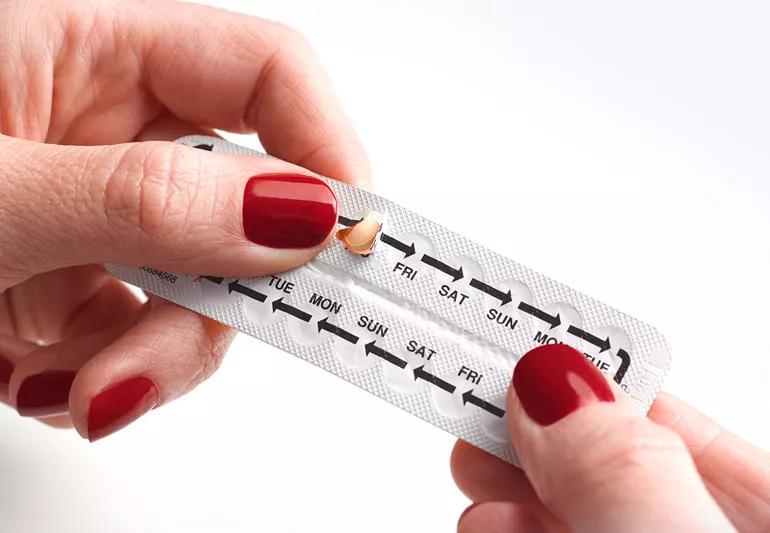Birth control can help you in ways you didn’t expect

While periods are a part of life, sometimes you want to be in control of when your period happens. For others, they may have a history of difficult periods and just want to do without the stress.
Advertisement
Cleveland Clinic is a non-profit academic medical center. Advertising on our site helps support our mission. We do not endorse non-Cleveland Clinic products or services. Policy
Taking birth control pills, or using a vaginal ring, continuously is a common and safe method for managing menstrual disturbances and other associated problems, says ob/gyn Linda Bradley, MD.
“I often recommend this approach for women who have very heavy bleeding or who have severe symptoms during their periods,” says Dr. Bradley. “But even women with normal menstrual cycles can benefit from using hormonal birth control to skip periods.”
Here are seven benefits of taking the pill continuously to skip periods:
1. Prevent anemia. If you have very heavy bleeding during your monthly cycle, you’re more likely to have anemia due to blood loss. Taking active birth control pills (the ones with hormones in them, not the placebos) continuously will make you skip your period. This prevents the heavy loss of blood that can lead to anemia.
2. Prevent menstrual migraines. You might have excruciating migraines around and during your period because your body is especially sensitive to the hormone fluctuations that occur. Avoiding your period can help stave off these painful headaches.
3. Have clearer skin. If your face regularly breaks out with pimples during your period, using the pill to avoid menstruating altogether can leave your skin clearer.
Advertisement
4. Enjoy a better quality of life. For some women, skipping periods means skipping debilitating cramps, bloating and moodiness that regularly arise at that time of the month. This gives them a better quality of life and relieves the stress of anticipating these symptoms.
5. Lower your risk for some cancers. Using hormonal methods to skip periods also decreases your risk of ovarian and uterine cancers.
6. Prevent ovarian cysts. Ovarian cysts are sacs filled with fluid that form on or in your ovary and about 10 out of 100 women have them. They may or may not be painful, but your doctor still needs to address them to identify the underlying cause. Skipping your period by using birth control pills (or other hormonal methods) can prevent these cysts from forming or help eliminate any you currently have.
7. Enjoy carefree travel and hobbies. If you’ve planned a weekend at the beach or want to wear those new white pants you just bought, you don’t want to have to worry about tampons and pads. With your doctor’s guidance, you can learn how to use birth control to ensure you don’t have a period during this time. That way, you can enjoy your activities carefree.
Sometimes skipping your period means enjoying your best friend’s wedding or your COVID-19-friendly vacation that much more. Plus, if you have painful symptoms or excessive menstrual bleeding that interferes with daily life every month, you might like a break from it for a while.
Some people may not like the thought of having to take a pill every day. Another option is using a vaginal ring contraceptive to skip periods. Normally, you would place the ring in your vagina and wear it for three weeks and then take it out for seven days to have a period. Then you would insert a new ring. But if you immediately insert a new ring after the three weeks end, you’ll avoid your period. Fertility returns quickly after discontinuing the use of either methods.
“The only real risk to using birth control to miss your periods is that there’s a small chance of breakthrough bleeding, which is any vaginal bleeding that occurs mid-cycle or when using hormonal methods to avoid your period,” explains Dr. Bradley. “Because of this, you might want to carry some pads or tampons with you just in case.”
Be aware that any medication can cause side effects, so be sure to ask your doctor if birth control is right for you and if you should use any backup contraceptives, such as condoms. Condoms can also help prevent sexually transmitted infections.
Advertisement

Sign up for our Health Essentials emails for expert guidance on nutrition, fitness, sleep, skin care and more.
Learn more about our editorial process.
Advertisement

The Yuzpe regimen is less effective than other forms of emergency contraceptives, and it’s associated with more side effects

Both are about equally effective when used properly — IUDs are long-lasting and don’t require you to think about them

Birth control medications are more than 99% effective, but only when used properly

Today’s birth control pills don’t usually cause depression — but hormones affect everyone differently

No, you can’t prevent pregnancy by douching after sex, having sex standing up or having sex only at the ‘safe’ time

IUDs can make your period lighter, heavier, irregular or stop it completely

Birth control gel is simple to use and an effective method for preventing pregnancy

The scenarios vary based on how many pills you’ve missed and whether you take a combination pill or progestin-only pill

Even small moments of time outdoors can help reduce stress, boost mood and restore a sense of calm

A correct prescription helps your eyes see clearly — but as natural changes occur, you may need stronger or different eyeglasses

Both are medical emergencies, but they are very distinct events with different causes